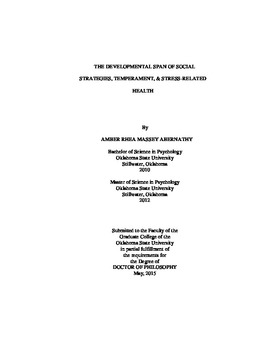| dc.contributor.advisor | Byrd-Craven, Jennifer | |
| dc.contributor.author | Abernathy, Amber Rhea Massey | |
| dc.date.accessioned | 2016-09-29T18:35:48Z | |
| dc.date.available | 2016-09-29T18:35:48Z | |
| dc.date.issued | 2015-05 | |
| dc.identifier.uri | https://hdl.handle.net/11244/45185 | |
| dc.description.abstract | Social hierarchies involve social dynamics that may create physical and emotional challenges (Hawley, 2003). One component related to social hierarchies is social positioning and the control of important resources. The method of controlling resources within a complex hierarchy is the basis of Resource Control Theory (Hawley, 1999). Most human studies reveal that effective social strategy use is related to social positioning. In particular, the combination of prosocial and coercive strategies (bistrategic controllers) is related to social dominance. Additionally, certain temperament traits such as effortful control are important in allowing the individual to use the most effective social strategy. The social strategy use may also be impacted by biology. The current set of studies examines the relationship between testosterone exposure in the prenatal environment (through the 2nd and 4th digit ratio), self-reported social positioning, temperament, social strategy usage, childhood psychosocial stressors, and health in middle childhood (10-12), emerging adulthood, and adulthood. The results of these studies show that at all developmental periods studied, social strategies are important to gain and maintain social positioning. It appears that in childhood and adulthood prosocial skills are the most valuable for social positioning while during emerging adulthood it is the use of both prosocial and coercive strategies that is most valuable for social status. Additionally, at all points in development studied here, effortful control was related to improved health and in some instances it was also related to social strategy usage. Finally, it appears the prenatal environment may create a developmental trajectory influencing social strategies use and outcome, and thereby influencing health. These preliminary findings may help clarify the relationship between social positioning, prenatal and postnatal environments, temperament, social strategies, and overall health throughout the developmental life span. | |
| dc.format | application/pdf | |
| dc.language | en_US | |
| dc.rights | Copyright is held by the author who has granted the Oklahoma State University Library the non-exclusive right to share this material in its institutional repository. Contact Digital Library Services at lib-dls@okstate.edu or 405-744-9161 for the permission policy on the use, reproduction or distribution of this material. | |
| dc.title | Developmental span of social strategies, temperament, and stress-related health | |
| dc.contributor.committeeMember | Kennison, Shelia | |
| dc.contributor.committeeMember | Thomas, David | |
| dc.contributor.committeeMember | Curtis, Tom | |
| osu.filename | MasseyAbernathy_okstate_0664D_13937.pdf | |
| osu.accesstype | Open Access | |
| dc.type.genre | Dissertation | |
| dc.type.material | Text | |
| thesis.degree.discipline | Psychology | |
| thesis.degree.grantor | Oklahoma State University | |
